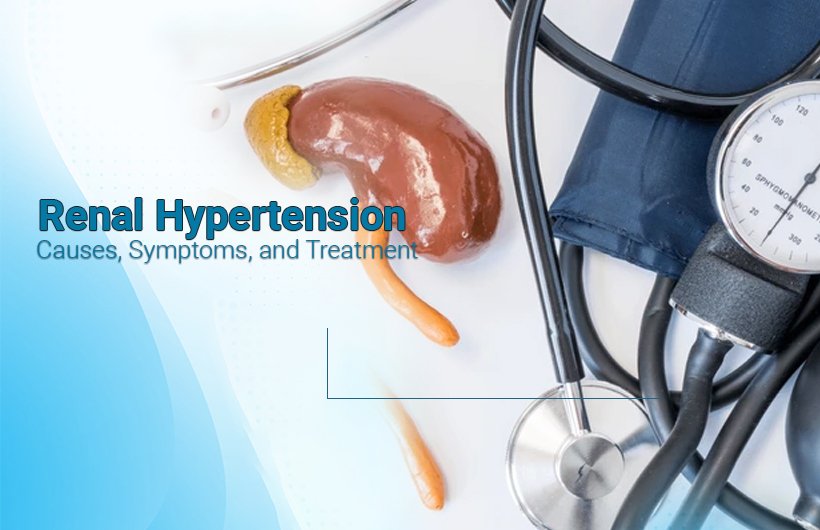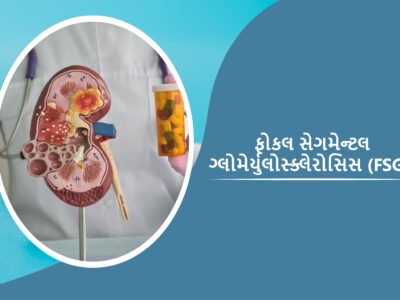Many people deal with high blood pressure, but not everyone knows that it can seriously affect your kidneys. When blood pressure and kidney health are connected, it leads to a condition called renal hypertension.
This problem can cause long-term damage if not treated early. In this blog, we’ll explain what it is, how it happens, the symptoms to watch out for, and the best treatments available. Understanding conditions like hypertensive kidney disease, hypertensive chronic kidney disease, and the link between CKD and hypertension can help you protect your health.
What is Renal Hypertension?
Renal hypertension is a type of high blood pressure caused by poor kidney function. It can also happen the other way around—where high blood pressure damages the kidneys. Over time, this cycle leads to serious issues like chronic kidney disease and hypertension, or even hypertensive chronic kidney disease.
Types of Renal Hypertension
- Renovascular Hypertension: This happens when the blood vessels going to your kidneys become tight or blocked, which reduces blood flow. It reduces blood flow and triggers the kidneys to raise blood pressure even more.
- Hypertensive Kidney Disease: Long-term high blood pressure causes slow damage to the kidneys. This condition leads to CKD and hypertension if not controlled in time.
How the Kidneys Help Control Blood Pressure
Your kidneys:
- Remove extra salt and water from the body
- Release hormones like renin to manage blood flow
- Balance key minerals like sodium and potassium
When kidneys stop doing these jobs properly, blood pressure rises, which leads to hypertensive renal disease.
What Causes Renal Hypertension?
Several conditions can lead to this issue:
- Renal artery stenosis (narrowing of kidney blood vessels)
- Glomerulonephritis (inflammation in kidney filters)
- Polycystic kidney disease (cysts that damage kidney tissue)
- Diabetic kidney disease (kidney damage from uncontrolled diabetes)
- Chronic kidney disease (leading to high BP and more damage)
These conditions are often linked to hypertensive kidney disease and chronic kidney disease and hypertension.
Who is at Risk?
Your chances of getting renal hypertension go up if you
- Have diabetes or existing kidney problems
- Are above 40 years old
- Smoke or drink alcohol regularly
- Are overweight or inactive
- Have high cholesterol
- Have a family history of blood pressure or kidney problems
Symptoms of Renal Hypertension
In early stages, there may be no signs. As the condition worsens, symptoms may include:
- Swelling in feet, face, or eyes
- Reduced or foamy urine
- Blood in urine
- Headaches or confusion
- Tiredness or trouble focusing
- Uncontrolled high blood pressure
If you notice any of these signs, consult a kidney doctor in Ahmedabad without delay. Early detection can slow down the effects of hypertensive renal disease.
How is Renal Hypertension Diagnosed?
Doctors may perform:
- Blood pressure checks
- Kidney blood tests (creatinine, urea, GFR)
- Urine tests (to check for protein or blood)
- Imaging scans (like ultrasound or CT angiography)
- Renin level tests (to assess hormone balance)
This makes it easier to find out and manage problems like hypertensive chronic kidney disease and CKD and hypertension more correctly.
Treatment of Renal Hypertension?
Lifestyle Changes
- Eat a low-salt diet
- Exercise regularly (like walking or yoga)
- Stop smoking and limit alcohol
- Keep blood sugar and cholesterol in control
- Manage stress
Medications
- ACE inhibitors or ARBs to relax blood vessels and protect kidneys
- Diuretics to reduce water retention
- Calcium channel blockers or beta-blockers
- Statins for cholesterol management
These medicines help manage hypertensive kidney disease and control the risks of chronic kidney disease and hypertension.
Advanced Treatments
For severe cases:
- Angioplasty and stenting to open narrowed kidney arteries
- Kidney Dialysis to clean blood when kidneys fail
- A kidney transplant may be needed if the kidneys stop working completely because of hypertensive renal disease.
Regular Monitoring Is Key
If you have CKD and hypertension, follow your doctor’s advice strictly. Make sure to:
- Check blood pressure often
- Get kidney tests regularly
- Monitor urine protein levels
- Follow dietary guidelines
- Never skip medications
What Can Happen If You Ignore It?
If not treated on time, hypertensive chronic kidney disease may lead to:
- Total kidney failure
- Heart problems like heart attacks or heart failure
- Stroke
- Vision damage
- Need for kidney dialysis or kidney transplant
Taking timely action can prevent these serious complications.
Can it be prevented?
Yes. Here’s how to prevent hypertensive renal disease and protect your kidneys:
- Stay physically active
- Drink enough water
- Eat healthy food (low in salt and fat)
- Take your BP and diabetes medicines regularly
- Get regular health check-ups if you have a family history
Understanding the connection between chronic kidney disease and hypertension can help you take early steps toward prevention.
Living with Renal Hypertension
Living with this condition is possible with the right care. Here are simple things you can do:
- Stay on your treatment plan
- Keep a healthy routine
- Always tell your doctor if you notice any new or different symptoms.
- Stay mentally strong – your mindset matters
Conclusion
Renal hypertension is a serious health issue, but it can be managed effectively with early diagnosis and proper care. Conditions like hypertensive kidney disease, hypertensive chronic kidney disease, CKD and hypertension, and chronic kidney disease and hypertension are closely connected—but they don’t have to control your life.
For the right guidance and treatment, we highly recommend consulting Dr. Ravi Bhadania, a trusted and experienced kidney and hypertension specialist. His patient-friendly approach and advanced treatment plans have helped many people live healthier, longer lives—even with complicated kidney and blood pressure issues.
If you or your loved one is facing high BP or kidney concerns, don’t delay. Book a consultation with Dr. Ravi Bhadania today and take the first step toward better health and peace of mind.


